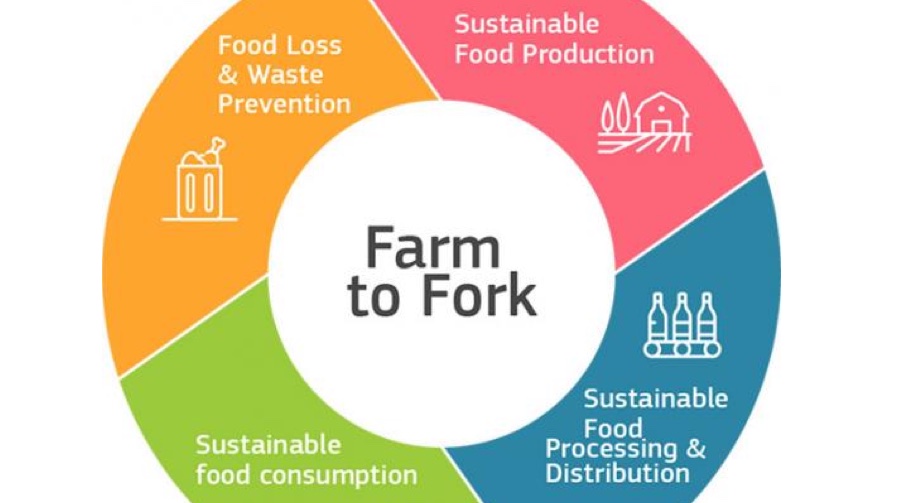By: Eduardo Cuoco, Director of IFOAM Organics Europe
The Farm to Fork (F2F) and EU Biodiversity strategies put organic farming at the heart of the transition to sustainable food systems. At the same time, the European Commission’s new EU Organic Action Plan for the development of the organic sector, published on 25 March 2021, marks a new era for the transformation of our food and farming systems towards organic and agroecology.
Among others, the F2F strategy foresees concrete steps to boost organic demand through the €49 million budget for organic within the promotion policies framework as well as the integration of organic products into the minimum mandatory criteria for Green Public Procurement (GPP). On top of that, the allocation of at least 30% of the Horizon Europe funding for agriculture, forestry, and rural areas to topics relevant for the organic sector is a timely step forward considering the importance of knowledge in organic food systems.
As IFOAM Organics Europe, we welcomed the Commission’s new Organic Action Plan (OAP) 2021-2027 and particularly its “push-pull” approach, aiming at balancing increases in both production and demand of organic products. It will be an important instrument for reaching the Farm to Fork strategy’s target of 25% organic land by 2030. We are also looking forward to the annual EU ‘Organic Day’, an ideal opportunity to take stock of how the Organic Action Plan is performing. For more information on the OAP, have a look at our infographic.
To ensure the success of the OAP in reaching the 25% organic land target and transitioning towards more sustainable food systems, we must not forget the importance of the involvement of actors at all levels, especially EU, national, regional, and local actors.
One of the initiatives involving actors from across the EU is the Organic Cities Network, a pan-European organisation representing the various organic cities in the EU Member States. Its members act as an umbrella organisation for the regional organic cities helping to promote the cause of organic food and farming on the European and EU level. In 2018, IFOAM Organics Europe and the Organic Cities Network agreed on working together towards a fair, environmentally conscious, healthy, and caring food and farming system. This includes cooperation on reform of the Common Agricultural Policy (CAP), regional and local food supply chains, Green Public Procurement (GPP) policies, Research and Innovation, the trust cost of food and more.
Cities are increasingly recognised as important players in contributing to European agricultural policies. European cities, towns and regions are playing an important role in promoting organic. With their wealth of expertise and experience they contribute to European policies that foster food security and sustainable development, improve quality of life of local and regional residents and work towards reaching the Sustainable Development Goals (SDGs). As the European organic movement, we want to take the lead in transitioning towards sustainable food and farming systems. This transition is only possible through a joint effort of the entire food and farming sector and policy-makers. Local authorities play an important role in guaranteeing access to organic food for European citizens. Specifically, cities play an important role in promoting and sourcing organic products for public procurement, thus stimulating sustainable diets, the development of local and regional supply chains and increased awareness of the benefits of organic food.
Of course, the success of the Organic Action Plan will also depend on how well the F2F strategy and its priorities are reflected in the next CAP. It is crucial that Member States implement the new action plan through their CAP Strategic Plans. So, as IFOAM Organics Europe, we welcome the Commission’s ambition to ensure Member States make the best of the possibilities offered by the new CAP to support their national organic sector and strengthen farm advisory services. Organic and conventional farmers transitioning to organic should be rewarded for the benefits they deliver to nature and society, while farm advisory services geared towards organic and other agroecological practices should receive adequate funding.
We are looking forward to continuing collaborating with the Organic Cities Network and other relevant institutions and interested stakeholders to make this new Organic Action Plan a success.
IFOAM Organics Europe is the European umbrella organisation for organic food and farming. We represent organic in European policymaking and advocate for a transformation of food and farming. Our work is based on the principles of organic agriculture – health, ecology, fairness and care. With more than 200 members in 34 European countries, our work spans the entire organic food chain. Find out more on www.organicseurope.bio and follow @OrganicsEurope on Twitter, Facebook & LinkedIn.

